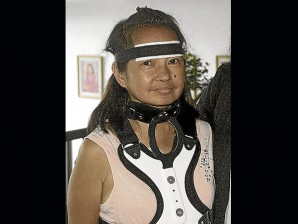Arroyo camp asks Supreme Court to junk electoral sabotage case
The camp of Gloria Macapagal-Arroyo has asked the Supreme Court to stop the electoral sabotage case against her from proceeding and to issue a temporary restraining order and writ of preliminary injunction during its next full court session, which is on Tuesday.
The Arroyo camp’s manifestation, as divulged by Associate Justice Ma. Lourdes Sereno, was made following the closing of Thursday’s oral arguments on the validity of the joint Department of Justice-Commission on Elections (DOJ-Comelec) panel that recommended the filing of the case against her.
The justices have yet to rule on the manifestation. A favorable ruling will lead to “status quo ante,” meaning the situation reverts to the time before the controversial act being questioned by the Arroyo camp arose, Sereno explained.
Solicitor General Jose Anselmo Cadiz, who represented the government in the oral arguments, said he had not received his copy of the manifestation and would oppose it.
Chief Justice Renato Corona concluded the oral arguments by ordering the defense and the prosecution to file their memoranda within 30 days.
The Arroyo camp wanted a shorter period. But Corona pointed out that the government side would have to be given time to reply, and that the high court would not be able to tackle the memoranda because the holiday recess was approaching.
A ruling by the high court that the creation of the DOJ-Comelec panel was unconstitutional would invalidate the panel’s finding of probable cause, as well as the electoral sabotage case filed against Arroyo in the Pasay City Regional Trial Court (RTC), and the warrant issued by Judge Jesus Mupas for her arrest.
The arraignment of the former President and now Pampanga representative has yet to be scheduled because the judge is awaiting the high court’s ruling.
Arroyo is under hospital arrest and is to be moved Friday to the government-run Veterans Memorial Medical Center in Quezon City from St. Luke’s Medical Center in Taguig City.
Untold story
During the oral arguments, Senior Associate Justice Antonio Carpio raised the point that if the preliminary investigation panel’s creation were ruled illegal and its finding voided, Arroyo, if she chose to, could leave the country and just wait out the five-year prescriptive period of the offense that the government would file against her.
Comelec Chairman Sixto Brillantes Jr. had earlier said that in the event that the panel was deemed unconstitutional, the poll body would just “rehash” the panel’s findings and file the same case.
In defending the creation of the joint panel, Cadiz reiterated that the Comelec did not compromise its independence and that the panel found probable cause against Arroyo because she had failed to submit her counteraffidavit.
“She did not tell her story. She chose not to tell her story,” Cadiz repeatedly told Associate Justices Diosdado Peralta, Roberto Abad and Teresita de Castro.
He said the former President employed “dilatory tactics” by asking that the documents be photocopied instead of filing a counteraffidavit at the end of the 10-day period given her.
“There was a fast break, but only because nobody guarded our point guard. Shooting was easy,” Cadiz said, comparing the “hasty” filing of the suit to a basketball game.
He said the panel only had one story to look at, and it did not take the members a long time to find probable cause.
Strong testimony
Cadiz said the documents wanted by Arroyo—annexes to the separate electoral sabotage case filed by Senator Aquilino Pimentel III—were “irrelevant to the case.”
He said the finding of probable cause was based simply on the testimony of former Maguindanao Administrator Norie Unas—that he had heard Arroyo ordering the rigging of the results of the 2007 senatorial elections.
Cadiz also said that Unas’ testimony was “strong,” and that the Senate Electoral Tribunal, which counts some justices as members, had already recognized that cheating took place in Maguindanao. This recognition resulted in then Senator Juan Miguel Zubiri vacating his seat in favor of Pimentel.
Questions
The Solicitor General said all the recommendations of the preliminary investigation panel passed through the Comelec, which did not adopt the panel’s report in toto and even revised or reversed some items.
The justices asked why the rules governing the panel were not published, and if the rules were “supplementary” or “complementary” to the existing rules of court and the Comelec rules of court.
They asked why the filing of the case against Arroyo was “rushed,” why some Comelec commissioners had complained that there was voting on the filing of the case when they had not yet read the panel’s report, why Arroyo was not allowed to file a motion for reconsideration, and why Brillantes, the lawyer of the opposition in 2007, did not inhibit himself.
Cadiz said the investigation of the cheating was “very, very broad,” covering the entire conduct of the elections.
He said the investigation was a “collaborative effort” of the Comelec and the DOJ, which are given joint jurisdiction by the law.
Justice Lucas Bersamin wondered if the panel members could manufacture findings “to satisfy their bossings.”
He and the other justices pointed out that the panelists were from the DOJ and the Comelec, and that their findings were based on the report of a fact-finding team composed of people from both agencies.
Peralta also criticized the “piecemeal” findings of the panel and questioned why his “mentor” at the Sandiganbayan, former Comelec Commissioner Nicodemo Ferrer, had the accusations against him shelved “for further investigation” and not dismissed or upheld outright by the panel.
Bersamin also raised the issue of whether the Pasay RTC was the correct venue of the electoral sabotage case and not the Sandiganbayan, which, he said, had jurisdiction over the actions of public officials.
Originally posted at 09:27 pm | Thursday, December 08, 2011















